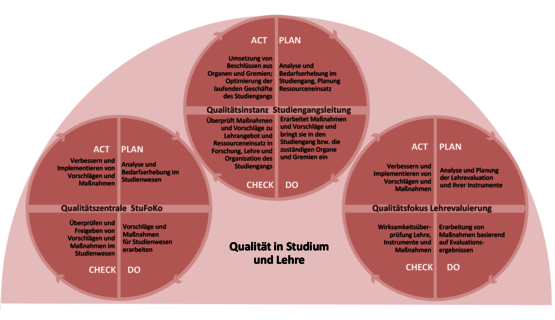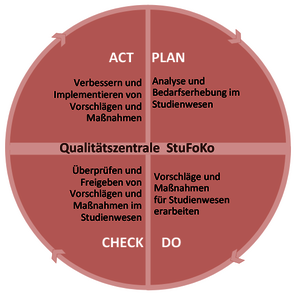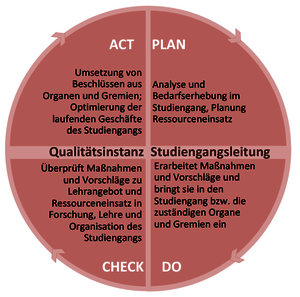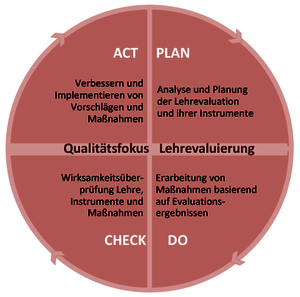- About the university
- Rector’s office
- Administration
- General Contact Information
- Student Affairs Office
- Library and Media Centre
- Faculty Management & Secretary's Offices
- Orchestra Management
- Event Management
- External Relations, Development and Quality Assurance
- Marketing and Communication
- Human Resources Management
- Accounting/Controlling
- IT Management
- Infrastructure/Facility Management
- Porters
- Quality management
- Sites
- Opening hours
- Vollpension at the MUK
- Cooperations
- MUK.youngstars
- Vacancies
- Press
Quality in studies and teaching
Quality Central Study and Research Commission
Quality Authority Head of Study Programme
Quality Focus Teaching Evaluation
The quality of studies and teaching is assured by the MUK quality management system on three levels. These levels serve the regular and systematic collection of information in studies and teaching and, in interaction with the other quality assurance processes at the MUK, enable the implementation of measures for the development, establishment and further development of the degree programs.
The Quality Center for Studies and Research Commission (StuFoKo) is the central interface for quality assurance in the study system.
The Quality Authority Head of Study Programme designates the operational responsibility of the directors of studies in the quality assurance of the individual degree programs.
The Quality Focus Teaching Evaluation includes all instruments and measures for quality assurance in teaching at the MUK.
These levels serve the regular and systematic collection of information in studies and teaching and enable the implementation of quality assurance measures in this area. If necessary, they are reviewed by the Office of the Dean of Studies and the Senate and are networked with each other. The interaction of these levels, instances and organs is illustrated in the following process descriptions.

The system enables the implementation of the strategy and goals formulated in the MUK mission statement and development plan in studies and teaching. The processes employed ensure continuous further development and evolution in studies and teaching and check their effectiveness.
Quality Central Study and Research Commission
Based on the provisions of the MUK statutes, a Study and Research Commission (StuFoKo) has been established at each faculty.
All groups of persons from the academic field are equally represented in this central body of quality assurance.
It is thus an effective body for university participation by students and faculty. The statutes of the MUK stipulate that the StuFoKo is made up of three equal numbers of heads of study programmes of the faculty, elected representatives from the group of professors and lecturers of the faculty and the students of the faculty sent by the university representatives. The StuFoKos of the faculties elect the Dean from among their members.
Both faculties have one StuFoKo each. For inter-faculty studies and research matters, a joint commission of the two study and research commissions has been set up, consisting of representatives of all the above-mentioned groups of persons and the head of the Centre for Science and Research. (The joint commission of the two StuFoKos corresponds to the representation of the StuFuKo quality centre and is therefore not listed separately here). The Study and Research Commission meets at least twice per semester, its term of office is three years.
Together with the Quality Authority Head of Study Programme, the Study and Research Commission is responsible for ensuring the quality of the artistic, scientific and pedagogical work in studies and teaching.
The StuFoKos and the joint commission of the StuFoKos, with the involvement of the Director of Studies, take on the following quality assurance tasks, which are submitted to the Senate for decision if necessary:
Development of drafts for new curricula and drafts for changes to existing curricula
Preparation of proposals for amendments to the study and examination regulations
Substantive guidelines for Commission audits
Promotion of young scientists and artists
Proposals for interdisciplinary research projects and focal points
Ensuring that the full range of courses in inter-faculty studies is offered according to the curricula within the limits of available resources
Committees and commissions may be established by the Study and Research Commission to fulfil its tasks, make decisions and provide advice.

The fulfilment of these tasks follows the quality assurance PDCA cycle.
PLAN Analysis and needs assessment in the study system
DO Preparation of proposals and measures for studies
CHECK Review and approval of proposals and measures in the study system
ACT Improve and implement proposals and measures
The work of the study and research commissions is documented by minutes of meetings and resolutions. The resolutions of the StuFoKo are forwarded in the form of minutes of resolutions to the Rectorate and subsequently to the Senate for resolution. The MUK statutes regulate the implementation of the StuFoKos' resolutions in accordance with the committees' statements and decisions on them.
Quality Authority Head of Study Programme
According to the statutes, the heads of study programmes are responsible for ensuring the quality of the artistic, scientific and pedagogical work in the respective study programmes. Because they play such a central role in the quality development of the MUK, they are subject to special appointment procedures and are regularly evaluated by internal and external experts through reappointment procedures. Heads of study programmes act as the central interface of the individual study programmes with the organizational units, bodies, committees, students and lecturers of the MUK study programmes and act in coordination with the dean of the respective faculty. This constant exchange among colleagues enables them to optimally fulfill their role as responsible for quality assurance in the degree program according to the statutes. In accordance with the MUK statutes, the head of study programme assumes the following quality assurance tasks:
Ensuring the quality of the artistic, scientific and educational work in the programme
Ensuring the complete range of courses according to the curricula within the framework of the available resources
Responsibility for the resources available to the programme, especially budget preparation and execution
Implementation of resolutions in study and examination matters, as far as the study programme is concerned
Proposal to the dean on the admission of applicants based on the admission procedure and allocation of students to a lecturer assigned to the faculty
The fulfilment of these tasks follows the quality assurance PDCA cycle.
PLAN Analysis and needs assessment in the study programme, planning of the use of resources.
DO Develops measures and proposals and brings them into the study programme or
the responsible bodies and committees
CHECK Checks measures and proposals for course offerings and use of resources in research
and artistic research, teaching and organisation of the course
ACT Implementation of resolutions from organs and committees; optimization of the current
business of the study programme
The work of the Quality Authority Head of Study Programme is documented by reports, minutes of committees and bodies and in the form of study plans and study contents.
Quality Focus Teaching Evaluation
Derived from the principles of student participation, co-responsibility and co-determination formulated in the MUK mission statement, teaching evaluation aims at quality assurance and the further development of university teaching on a semester-by- semester basis. The MUK teaching evaluation makes use of various instruments. All aspects that contain information about courses are incorporated into the evaluation of teaching at the MUK. This includes information from standardized written and oral instruments as well as data and information from the environment. The chosen structure of the evaluation enables a continuous improvement process, involves all participants and allows the effectiveness of the evaluation to be continuously monitored.
Teaching evaluation is composed of several instruments and leads to quality development at different university levels. Findings from teaching evaluation are incorporated into the individual degree programmes, the faculties and the university bodies and committees.
Course-centred instruments
Digital course evaluations are carried out anonymously by means of standardized questionnaires for the courses. These questionnaires, which have been approved by the Senate, are published in the MUK Quality Management and Organization Manual. The evaluation conducted online is based on the evaluation guidelines of the statutes. It is obligatory for all courses offered that meet the activation criteria (e.g., at least three participating students for a single course) to be evaluated each semester. Students are automatically requested by e-mail to evaluate their courses. The digital course evaluation is subject to the company agreement on the evaluation of courses and study programmes (2010).
Development measures were taken in the last accreditation period to improve digital course evaluation. Following quality conferences in the winter semester 2019/20, the MUK Quality Team, together with the Director of Studies, representatives of both faculties and in consultation with the deans, recommended bundling similar courses in order to increase the number of courses that can be evaluated digitally in accordance with the existing company agreement.
In the Rectorate Jour fixe of 20.2.2020, the members of the Rectorate approved the proposal for the further development of digital course evaluation and called upon the Head of Department and Director of Studies to implement it accordingly.
They initiated the following measure: In order to improve digital course evaluation, the TU Graz will enable a connection to the evaluation tool EvaSys (www.evasys.de) by further developing the university management system used by the MUK. This will result in the desired, significantly improved possibilities of digital course evaluation. A test phase has started in winter semester 2019/20 at University of Technology Graz and will lead to the implementation of EvaSys in the university management system MUKonline if successful.
Courses are surveyed semester by semester in a standardized time frame and serve to check (see presentation of the effectiveness check) the course contents and goals, the examination methods, the admission requirements, the time and location of the courses as well as all other course-relevant parameters in the individual study programmes. Should there be a need for changes in the courses of these curricula, the further implementation is the responsibility of the heads of study programmes, the respective study and research commissions, the senate and the rectorate and shall be carried out in accordance with the regulations of the statutes.
Evaluation forms, in the course of master classes/guest lecturers, workshops, etc., and summaries of the guest lecturers form individual programme-specific instruments for the evaluation of courses and teaching initiatives that take place irregularly.
Student-centered instruments
Mentoring takes place on a mandatory basis within the framework of the student's introductory phase, which is regulated in the MUK statutes. In this compulsory course, the progress of the student's studies is reviewed during the introductory phase, and the further course of studies is also discussed. The goal of this mentoring is to enable the student to correctly assess his/her study situation under competent and professional guidance and to evaluate his/her personal development possibilities and career prospects. In the course of the mentoring, the head of the study programme also decides on the suitability of the student to continue his/her studies.
Feedback on artistic, artistic-scientific and pedagogical development is given to the students throughout the course of their studies by lecturers and heads of study programmes and is guaranteed by numerous formats in the individual study programmes (e.g. feedback rounds after internal presentations, graduate auditions, selection auditions, practice auditions, practice competitions, Fidelio competition, informal auditions, prototypes, work shows and tryouts).
Student interviews, in groups or individually, offer students the opportunity for direct feedback and help shape their studies (e.g. open space with students, one-on-one meetings with students, impulse days, heads of study programme feedback meetings for students, student forum, final discussions in supplementary courses).
Lecturer-centred instruments
Discussions between heads of study programmes and lecturers take place on the basis of the regular quality assurance in presence of heads of study programmes at events of their own programme. Further collegial feedback takes place regularly in connection with the commission examinations.
Cyclical meetings of lecturers such as study programme conferences, meetings of lecturers as well as topic-specific meetings are collegial forums for the exchange of information on agendas relevant to teaching such as the comparison of teaching content.
The fulfilment of these tasks follows the quality assurance PDCA cycle.
PLAN Analysis and planning of teaching evaluation and its instruments
DO Development of measures based on evaluation results
CHECK Effectiveness review of teaching, instruments and measures
ACT Improving and implementing instruments and measures




